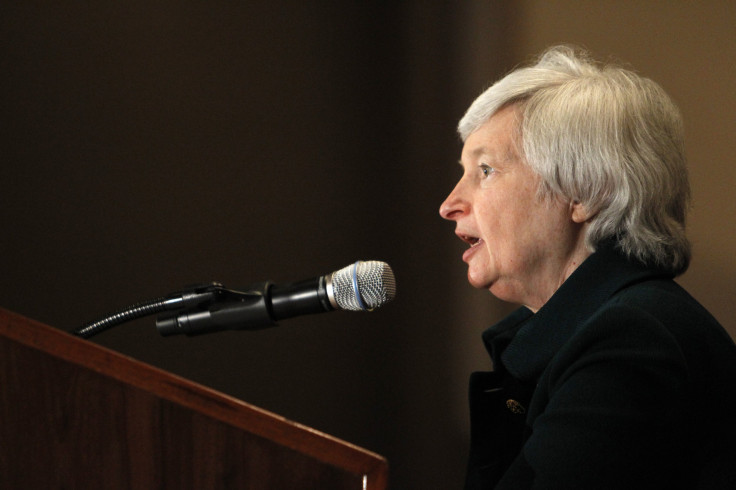President Obama Nominates Janet Yellen As Fed Chair, Senate Confirmation Expected To Be Relatively Easy

As expected, U.S. President Barack Obama on Wednesday nominated Janet Yellen to succeed Ben Bernanke as chair of the Federal Reserve Board when his term expires on Feb. 1, 2014. Obama’s pick marks a safe, not-so-dramatic end to a wild nomination process.
But given the chaotic situation in Washington, global investors can definitely use some predictability on the Fed policy front.
“Yellen’s nomination provides the markets some needed clarity on the outlook for monetary policy leadership at a time when dysfunction in fiscal policy resulting in the federal government shutdown and looming debt ceiling hike dominates financial market and public concerns,” said Stuart Hoffman, chief economist at PNC Financial Services.
Yellen is an excellent choice with years of Fed experience -- as San Francisco Reserve Bank president and Fed Board vice-chair, impeccable economic credentials and the leadership qualities necessary to guide the Fed through the monetary policy and financial industry supervisory challenges in the coming four years of her term, Hoffman said.
The White House said Wednesday that Yellen would be “one of, if not the most, qualified nominee for this position ever.” The White House is confident that the U.S. Senate will examine Yellen's record, and will hopefully proceed expeditiously with her nomination.
Consider It Official
Brian Gardner, senior vice president of Washington research at the investment bank KBW, expects Yellen to be “easily confirmed.” What’s more, Yellen is likely to face an easier confirmation process than her current boss, Bernanke, did in 2010.
Bernanke scraped by with the narrowest margin in the history of the position – a vote of 70 to 30 -- when he was confirmed by the Senate for a second term as Fed chief. While Bernanke won a majority of both Democrats and Republicans, he received more “no” votes than any Fed chairman before, topping Paul Volcker, who was confirmed 84 to 16 in 1983.
Yellen probably won’t be confirmed by the Senate unanimously -- a number of Republicans will vote against her on the grounds that she is too dovish for the Fed. The Senate’s No. 2 Republican, John Cornyn of Texas, voiced strong reservations on Wednesday about Yellen’s nomination, saying that the last thing the U.S. needs is a chairwoman who is intent on more quantitative easing.
“More Republicans may vote against Yellen, but given that she is not a highly polarizing figure and is not seen as a partisan, not to mention the gender politics of her being the first woman nominated to lead the Fed, we doubt she will be blocked by Republicans,” Gardner said, adding that Yellen is expected to receive unanimous Democratic support.
Senate Democrats have already written a letter to Obama (obtained by the Wall Street Journal) praising Yellen’s experience in steering monetary policy.
Regarding timing, the government shutdown may marginally slow the confirmation process, but Gardner expects the Senate Banking Committee will have a confirmation hearing on Yellen by Thanksgiving and the Senate should be able to vote on her nomination by year-end. However, there is a small chance that the vote could drift into January 2014.
The Yellen Fed
More than anything, Yellen represents stability and continuity at the world’s most powerful central bank.
“The Yellen Fed will look remarkably like the Bernanke Fed – willing to take extraordinary actions to support the economic recovery when it is in danger of faltering, but circumspect about the costs and benefits of its actions,” said Paul Edelstein, director of U.S. Financial Economics at IHS.
Yellen is expected to keep the Fed on its current taper path, but taking a slow and cautious approach as Bernanke did. “She will push back against the taper crowd as long as fiscal uncertainty threatens the labor market,” Edelstein said.
Capital Economics’s Paul Dales sees a slightly bigger risk that under Yellen’s stewardship, the Fed will fail to tighten monetary policy in time once the recovery gathers momentum, eventually triggering an unwanted surge in inflation.
That said, Yellen will still hold just one of the 12 policy votes. In that regard, the balance of the FOMC is likely to be more affected by the annual voting rotation of the regional Fed presidents and the filling of the vacant positions on the Board of Governors, including who will replace Yellen as vice chair.
According to Dales:
Next year’s voting rotation in January is likely to result in a more hawkish FOMC. The reasonably dovish Charles Evans and Eric Rosengren will be replaced as voting members by the arch-hawks, Charles Plosser and Richard Fisher. What’s more, there will soon be three voting positions on the Board of Governors to fill. One space has been vacant since Elizabeth Duke left in August, Bernanke will soon vacate another and Sarah Bloom Raskin will move to the Treasury. We don’t know who will fill these positions or how dovish/hawkish they will be. And at a time when the FOMC is divided, Governors may not vote with the Chair. Perhaps Yellen’s biggest challenge will be uniting the FOMC and tidying up its blurred policy message.
Yellen’s nomination doesn’t change Capital Economics’ view that interest rates will remain at rock bottom for at least another 18 months and rise only gradually after that.
© Copyright IBTimes 2024. All rights reserved.





















